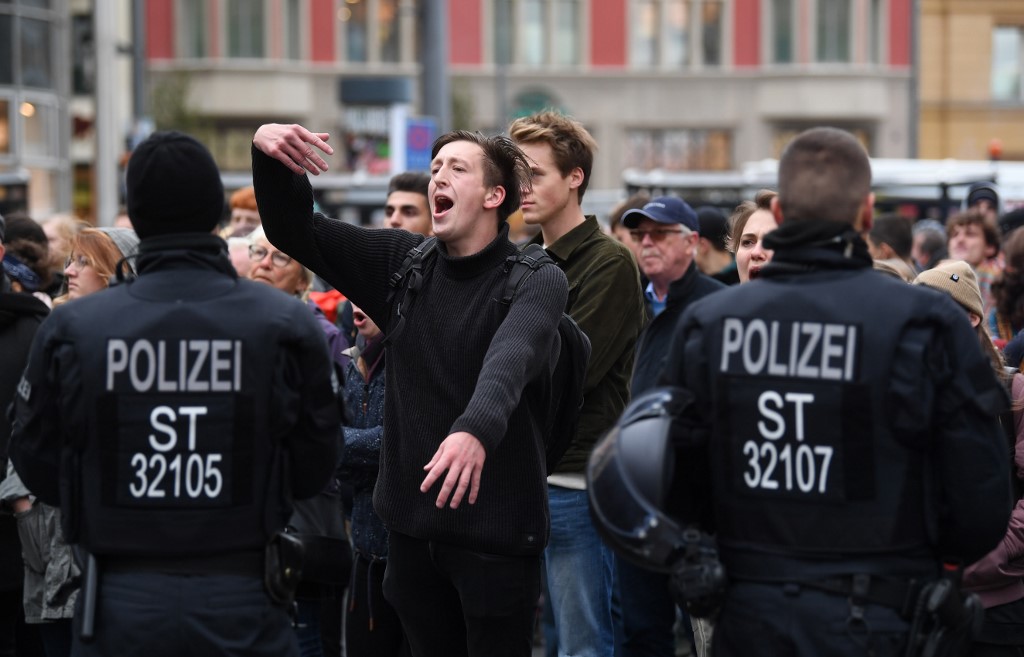Germany's Halle attack reveals problems with the term 'antisemitism'

Stephan Balliet is alleged to have carefully prepared this month’s deadly attack in the German city of Halle.
Apparently inspired by the Christchurch massacre of Muslims, he came with his homemade gun and an escape plan, and streamed his attack on the Twitch service, usually used to live-broadcast video games. Documents that he carried were full of white-supremacist material, calling on readers to kill Jews, non-whites, communists and “traitors”.
Balliet tried to enter a synagogue and failed, after which he fatally shot a woman outside. He continued his onslaught by fatally shooting a customer at a local kebab shop; he then hijacked a taxi and escaped, but was later apprehended by police.
'Double attack'
Balliet apparently did some homework, timing his attack for Yom Kippur, the holiest of Jewish holidays, when the synagogue would be full. While Jews fast on Yom Kippur, the kebab shop could have been a likely place to kill Muslims.
New MEE newsletter: Jerusalem Dispatch
Sign up to get the latest insights and analysis on Israel-Palestine, alongside Turkey Unpacked and other MEE newsletters
The German media, on the other hand, does not appear to have done its homework. For hours, it reported frantically on the attack with breathless updates, presenting the attack as though two Jews had been murdered at the synagogue.
The attacker was labelled as antisemitic before anything was known about him. In German media outlets in recent years, the term “antisemitism” has often been used with reference to the boycott, divestment and sanctions (BDS) movement against Israel.
The attack in Halle shows how meaningless the term 'anti-semitism' has become
In the ensuing hours, after the suspect was apprehended and police released his name and white-supremacist messages, the media started to acknowledge that Muslims were also a target of Balliet’s ire - but the damage was already done. Haaretz had already published an article explaining how the Jewish community in Germany was under a “double attack” from the far-right and “extreme Islam”.
It seems little was learned from the 2018 Pittsburgh synagogue massacre. Some far-right activists consider US and German Jews to be agents of a liberal, progressive agenda that they oppose.
At the same time, US and German government institutions hold an opposite, yet equally wrong view that Jews in their communities support the Israeli occupation and the racist and Islamophobic agenda of Prime Minister Benjamin Netanyahu, making any critique of Israeli policy a form of antisemitism.
Criticising Israel
The attack in Halle shows how meaningless the term “antisemitism” has become. Some of my German Arab friends have asked me, “Aren’t Arabs also Semites? Isn’t anti-Arab racism also antisemitism?” They have a point, but the word has traditionally been used to describe a very specific kind of hatred against Jews.
The term is a German invention, developed in the 19th century by agitator Wilhelm Marr, who founded the League of Antisemites. The Israel lobby in the US and Germany unfortunately rejects this understanding, claiming that the “new” antisemitism is manifested as criticism or attacks against the state of Israel.
The media confusion over the Halle attack underscores the problematic nature of the term “antisemitism” when referencing racially motivated hatred. The term “racism” would be more useful in building anti-racist coalitions and developing strategies to protect all people from violence.
After the Halle attack, Christians, Muslims and Jews came together to mourn and show solidarity in the fight against racism and religious intolerance. But the German media seemed more interested in covering the “official” response from the pro-Israel Central Council of Jews in Germany. Chairman Josef Schuster responded by accusing police of failing to protect the synagogue, suggesting there should have been armed guards present.
Revamping gun laws
This is a very Israeli solution, evoking images of armed security guards in every shopping centre in Israel. Israel has become known as a “security state” because of its obsession with security, although all of this security hardly makes Israel a safer place for Jews than Germany or nearly any other country in the world.

Schuster might have also missed an important lesson from the Halle shooting. The attacker allegedly intended to kill as many people as possible, but his homemade gun jammed and he had to flee.
The strict gun laws in Germany might have saved more lives that day than any number of armed police guards could have.
In the 2018 Pittsburgh synagogue attack, there were 11 casualties. The recent Christchurch massacre in New Zealand resulted in 51 deaths, prompting the government to announce a ban on semi-automatic weapons.
Let us hope that German authorities will not instead adopt a Trumpian, or Israeli-style solution of “more guns”.
The views expressed in this article belong to the author and do not necessarily reflect the editorial policy of Middle East Eye.
Middle East Eye delivers independent and unrivalled coverage and analysis of the Middle East, North Africa and beyond. To learn more about republishing this content and the associated fees, please fill out this form. More about MEE can be found here.






